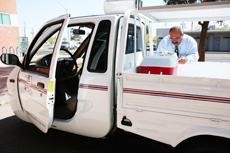You may feel pretty blue when you find a parking ticket on your window, but now the truck that delivered it has gone green.
A new electric and solar powered truck has been added to the Parking and Transportation Services’ fleet and was put into use for the first time yesterday, programs director Joyce Childers, said.
The little white Xebra Zaptruck has only three wheels, weighs about 500 pounds, and is only 5-feet-1 inch tall. It is powered by electric and solar power, said PTS marketing manager Bill Davidson.
There is a solar panel over the bed of the truck and the bed can be tipped up when the truck is not being driven to get more solar charge.
The solar power provides a little extra boost throughout the day for the car that can be electrically charged for up to 30 miles at a time and reach 40 mph, Childers said.
“”They needed something new so they decided to go with solar/electrical power because maintenance costs are much lower,”” Davidson said. “”But the biggest benefit is the environmental one. There’s no emissions.””
The truck was purchased to replace a 1998 gas engine pickup truck, Childers said.
The electric Zaptruck cost $16,000 with tax and will have extremely low upkeep and repair costs. A regular flex-fuel vehicle would cost about $18,000, plus higher maintenance costs and the price of fuel.
The truck will be used by the field operations department of PTS for parking enforcement, such as parking tickets and motor assistance, Childers said.
Childers said the rule for the university used to be that 25 percent of PTS vehicles had to have alternative fuel. She said she’s not sure what the quota is now, but if she tried to buy a gas-powered vehicle, she would have to have a really good justification for the purchase.
“”We haven’t bought a gas vehicle since 2003,”” Childers said.
She said the Zaptruck is charged with a regular wall outlet each night. Almost every parking space in the PTS lot already has a plug nearby , Childers said, so there isn’t even a need to make adjustments for the new truck and it costs only three cents to charge each mile.
The batteries for the Zap truck are gel batteries, instead of the water batteries the PTS electrical fleet of golf carts uses. The batteries for the electric golf carts must be replaced about every year, but the gel batteries the Zap truck uses will last two years at the very least and cost almost the same to replace, Childers said.
A red ice chest sits, attached, in the bed of the truck and acts as part of the AC unit. It is filled with water that runs up through pipes to the unit on the roof and cools the truck like a swamp cooler, Davidson said.
“”That’s about as green as you get,”” said Davidson.
The car also has heat and a radio. These are features the electric golf carts do not have, Childers said. The Zaptruck is a big upgrade in electric transportation.
Davidson said that PTS has plans for slowly replacing their fleet with electric cars as needed if this one works out well.









